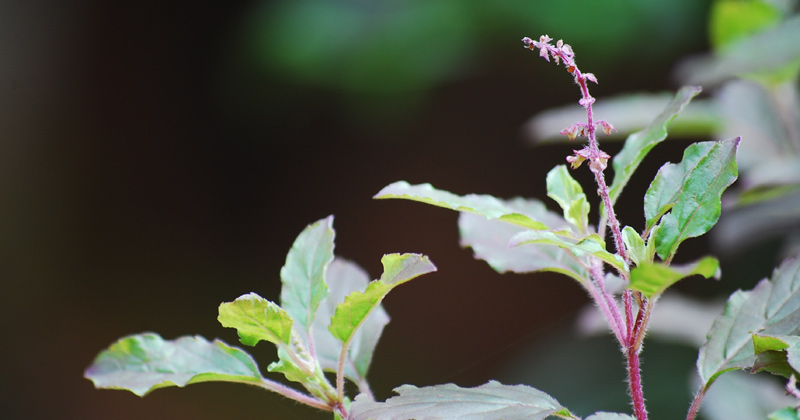Tulasi or Holy Basil as the world knows it is a little plant full of nutrients, vitamins and essential oils which can cure almost all diseases whether superficial or internal. The Tulasi is a very common plant found across India. It is worshipped in Hindu homes but can also be found growing in almost all kitchen gardens. The health benefits of Tulasi leaves and its derivatives are wide-ranging and very effective.

Medicinal Qualities of Tulasi – Benefits of Tulasi
A team of scientists at the Bengaluru-based National Centre for Biological Sciences (NCBS) and the Centre for Cellular and Molecular Platforms, Bengaluru have studied the genome structure of the Tulasi plant and have ascertained that the leaves certainly do have numerous medical implications and are antibacterial, antifungal, antipyretic, antioxidant, antiseptic and anticancer.
Ayurveda uses both Rama (bright green leaves) and Krishna (purplish green leaves) varieties of Tulasi in their medicines. It is therefore rightly called the ‘Queen of Herbs’.
Minerals, Vitamins and chemicals found in Tulasi leaves –
- Calcium
- Iron
- Manganese
- Potassium
- Magnesium
- Vitamins A, C, and K
- Oleanolic acid
- Ursolic acid
- Rosmarinic acid
- Eugenol
- Carvacrol
- Linalool
- β-caryophyllene (about 8%), β-elemene (c.11.0%), and germacrene D (about 2%)
Suggested Read: What are the Benefits Of Turmeric?

That is the reason why Tulasi can heal and cure a lot of ailments. Just to list a few –
What are the 8 benefits of Tulsi?
1. Medicines containing Tulasi extracts can cure chronic fevers and also malaria.
2. Tulasi tea helps in alleviating symptoms of the common cold and heals a cough faster.
3. Tulasi tea detoxifies the body and helps it to get rid of bloating and water retention and thus is known to help relieve arthritis.
4. A paste of Tulasi and neem leaves keeps the skin free of acne and blemishes. Some insect bites and skin diseases can also be cured in a similar manner or through medicinal derivatives.
5. Juice from Tulasi leaves or Tulasi tea with honey and ginger are effective against bronchitis and asthma.
6. The antibacterial property in Tulasi leaves extract fights against E.coli and hence gives relief in cases of Diarrhea and Dysentery.
7. Tulasi tea helps improve immunity and hence makes the body stronger against infections of many kinds.
8. Tulasi has the ability to inhibit an enzyme called COX-2. This enzyme triggers cancerous activity in case of skin cancer, lung cancer, and breast cancer. Tulasi’s preventative effects against liver cancer, stomach cancer, and oral cancer and also other types of cancer are being researched. Meanwhile, many people trust it as an alternative therapy.

Like all medicines with multiple components, Tulasi too has its own drawbacks. –
Side Effects of Tulasi
- It interferes with women’s reproductive cycles and is not recommended for those trying to conceive or pregnant.
- It lowers blood sugar. So it should be taken with precaution by diabetics.
- Small amounts of Tulasi can detoxify the liver but may damage it in greater amounts because of its eugenol content.
- Some Tulasi extracts may increase bleeding, slow blood clotting and may make bleeding disorders worse.
- This ubiquitous plant also has some use in the Indian art of Vastu Shastra. It is said to bring prosperity when placed at the entrance in Hindu homes.
Suggested Read: Benefits of Ashwagandha: The Miracle Berry
So, scientific or traditional, benefits of Tulasi far outweighs its side effects when consumed in moderation. It definitely provides some very effective home remedies for common ailments. We would request that you consult your trusted physician before putting Tulasi in any form to some serious use.


